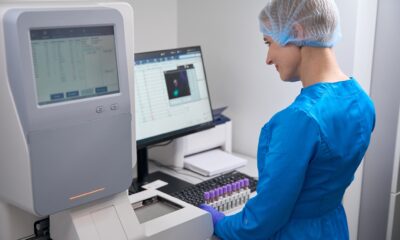Healthtech
How Quantum Computing Will Transform Healthcare Research and Analytics

The intersection of quantum computing and healthcare is poised to revolutionize medical research and analytics. As the demand for faster, more precise computational power increases, quantum computing offers unparalleled potential to solve complex problems in genomics, drug discovery, diagnostics, and personalized medicine. With its ability to process massive datasets exponentially faster than classical computers, quantum computing is set to drive unprecedented advancements in healthcare.
Understanding Quantum Computing in Healthcare
Quantum computing harnesses the principles of quantum mechanics to perform calculations at speeds unattainable by traditional computing systems. Unlike classical computers that process information in binary (0s and 1s), quantum computers use qubits, which can exist in multiple states simultaneously due to superposition and entanglement. This allows them to analyze vast amounts of healthcare data and uncover insights that were previously impossible to achieve.
Applications of Quantum Computing in Healthcare Research and Analytics
1. Accelerated Drug Discovery
Drug development is a lengthy and costly process, often taking over a decade from initial research to market approval. Quantum computing can:
- Simulate molecular interactions with extreme precision.
- Identify promising drug candidates faster by analyzing molecular structures.
- Optimize chemical compounds for targeted therapies.
2. Genomic Data Analysis and Personalized Medicine
Quantum computing can significantly enhance our understanding of genetic diseases and improve personalized treatment plans. Applications include:
- Rapid sequencing and analysis of entire genomes.
- Identification of genetic mutations linked to specific diseases.
- Tailoring treatment plans based on individual genetic profiles.
3. Enhanced Medical Imaging and Diagnostics
Medical imaging relies on complex algorithms to detect abnormalities. Quantum computing can improve this process by:
- Enhancing image processing for earlier and more accurate diagnosis.
- Optimizing machine learning models for detecting cancer and other diseases.
- Reducing processing time for complex diagnostic tests.
4. Optimized Healthcare Data Analytics
Healthcare generates massive amounts of data daily, from patient records to clinical trial results. Quantum computing can:
- Process and analyze large-scale datasets efficiently.
- Identify hidden patterns and trends in patient data.
- Improve predictive modeling for disease outbreaks and hospital resource management.
5. Breakthroughs in Neurological and Mental Health Research
Understanding neurological disorders such as Alzheimer’s and Parkinson’s remains a significant challenge. Quantum computing can:
- Model complex neural networks to understand brain function.
- Assist in the development of new treatments for neurodegenerative diseases.
- Analyze brain scan data at an unprecedented scale and speed.
Challenges and Considerations in Quantum Computing for Healthcare
Despite its promise, quantum computing faces several challenges before achieving widespread adoption in healthcare:
- Technical Limitations: Quantum computers are still in their early stages, requiring further development for stability and scalability.
- High Costs: Building and maintaining quantum computing infrastructure is expensive.
- Data Security Concerns: Quantum computing’s ability to break current encryption methods raises cybersecurity challenges in healthcare data protection.
- Integration with Existing Systems: Healthcare organizations must develop strategies to integrate quantum computing with traditional IT infrastructure.
The Future of Quantum Computing in Healthcare
As quantum computing technology matures, its impact on healthcare will become more profound. Future advancements may include:
- AI-Quantum Hybrid Systems: Combining quantum computing with AI for enhanced predictive analytics and diagnostics.
- Quantum-Powered Telemedicine: Optimizing remote patient monitoring and real-time diagnostics.
- Quantum-Driven Vaccine Development: Speeding up the creation of vaccines for emerging diseases.
- Global Collaboration in Medical Research: Leveraging quantum computing to accelerate large-scale clinical trials and data-sharing initiatives.
Conclusion
Quantum computing holds immense potential to transform healthcare research and analytics, offering groundbreaking capabilities in drug discovery, genomics, diagnostics, and data analysis. While challenges remain, ongoing advancements in quantum technology will pave the way for faster, more efficient, and highly precise healthcare solutions. As quantum computing continues to evolve, it promises to be a key driver in the future of medicine, leading to improved patient outcomes and innovative breakthroughs in healthcare.
Healthtech
The Future of Smart Pills: How Ingestible Sensors Can Improve Treatment Adherence

The rapid evolution of medical technology continues to redefine patient care, and one of the most promising innovations is the development of smart pills—ingestible sensors designed to improve treatment adherence. Medication noncompliance is a critical issue in healthcare, leading to worsened medical conditions, increased hospitalizations, and higher healthcare costs. Smart pills aim to revolutionize how medications are monitored and managed, ensuring that patients receive the full benefits of their prescribed treatments.
What Are Smart Pills?
Smart pills, or digital pills, are pharmaceutical capsules embedded with tiny ingestible sensors that track medication intake. These sensors communicate with an external wearable device, which then transmits data to a smartphone app or directly to healthcare providers. The information collected includes when the medication was taken and whether the prescribed dosage was followed.
These ingestible sensors are typically made from biocompatible materials, ensuring they are safe for consumption. Once ingested, they interact with stomach acids to generate a signal that is picked up by a receiver, confirming medication intake.
The Importance of Treatment Adherence
One of the biggest challenges in modern medicine is ensuring that patients take their medications as prescribed. According to the World Health Organization (WHO), approximately 50% of patients with chronic illnesses do not adhere to their medication regimens. This lack of adherence leads to disease progression, preventable hospitalizations, and an estimated $100 billion in avoidable healthcare costs annually.
Smart pills offer a solution by providing real-time monitoring and reminders to patients. By ensuring that medications are taken correctly, these pills can help improve health outcomes, particularly for individuals managing chronic conditions such as diabetes, hypertension, and mental health disorders.
Benefits of Smart Pills
- Improved Medication Adherence – Patients receive real-time notifications and reminders, reducing the likelihood of missed doses.
- Enhanced Doctor-Patient Communication – Healthcare providers can track patient adherence remotely, allowing for personalized interventions and adjustments.
- Early Detection of Health Issues – Smart pills can collect data on how a patient’s body responds to medication, offering insights that may help detect early signs of complications.
- Reduced Healthcare Costs – By preventing complications due to nonadherence, smart pills can lower hospital admissions and emergency care expenses.
- Better Management of Clinical Trials – In research settings, smart pills can provide accurate data on medication adherence, improving the reliability of clinical trial results.
Challenges and Ethical Considerations
Despite their potential, smart pills also pose several challenges. Privacy concerns are among the most significant, as these devices collect sensitive health data. Ensuring that this data is securely stored and used ethically is crucial. Additionally, some patients may feel uncomfortable with the idea of being monitored, raising concerns about autonomy and medical surveillance.
Another challenge is cost. As with any emerging technology, the initial implementation of smart pills may be expensive, limiting access for lower-income populations. However, as the technology advances and becomes more widespread, costs are expected to decrease.
The Future of Smart Pills
The future of smart pills is promising, with continued advancements in miniaturization, biocompatibility, and data security. Researchers are also exploring how smart pills can be integrated with artificial intelligence (AI) to provide predictive insights and personalized treatment plans.
Additionally, pharmaceutical companies are investing in partnerships with tech firms to improve smart pill technologies, making them more accessible and efficient. As regulatory bodies refine guidelines for their safe and ethical use, smart pills could soon become a standard part of medication management worldwide.
Conclusion
Smart pills represent a groundbreaking step in healthcare innovation, addressing one of the most pressing issues in medicine—treatment adherence. While challenges remain, their potential to improve patient outcomes, reduce healthcare costs, and enhance medical research is undeniable. As technology continues to evolve, smart pills may soon become an essential tool in personalized medicine, ensuring that patients get the most from their treatments.
Healthtech
The Role of Robotics in Surgery: Are We Ready for Fully Autonomous Surgeons?

Surgical robotics has revolutionized modern medicine, enhancing precision, reducing recovery times, and improving patient outcomes. With advancements in Artificial Intelligence (AI) and machine learning, the possibility of fully autonomous robotic surgeons is no longer just science fiction—it is becoming a reality. But are we truly ready for robots to operate without human intervention? This article explores the current state of surgical robotics, the benefits and risks of automation in surgery, and the ethical and technological challenges that must be addressed before fully autonomous surgeons become a reality.
The Evolution of Surgical Robotics
The introduction of robot-assisted surgery has transformed the operating room. The Da Vinci Surgical System, one of the most well-known robotic surgical platforms, enables surgeons to perform minimally invasive procedures with enhanced precision. However, it is still entirely controlled by human surgeons.
Over time, AI has been integrated into surgical robotics, allowing for:
- Real-time decision support – AI can analyze imaging data and assist surgeons in identifying abnormalities.
- Automation of repetitive tasks – Robots can suture, cauterize, and even perform delicate incisions with greater steadiness than human hands.
- Machine learning adaptation – AI systems can learn from past surgeries to refine techniques and improve efficiency.
Despite these advancements, we have not yet reached the point where robotic systems can perform complex surgeries independently.
Are We Ready for Fully Autonomous Surgeons?
The Case for Fully Autonomous Surgical Robots
The potential benefits of autonomous surgical systems are significant:
- Unmatched Precision and Stability
- AI-driven robots can eliminate human hand tremors, ensuring greater accuracy in delicate procedures such as microsurgery and neurosurgery.
- Machine learning algorithms can analyze vast amounts of surgical data to refine techniques and avoid errors.
- 24/7 Availability and Scalability
- Unlike human surgeons, autonomous robots do not experience fatigue, stress, or emotional distractions.
- They could be deployed in remote locations and underserved areas where skilled surgeons are scarce.
- Reduced Risk of Human Error
- Studies show that human errors contribute to a significant percentage of surgical complications. Robots operating with AI precision could minimize mistakes, leading to better patient outcomes.
- Faster and More Efficient Procedures
- AI-powered robotic systems can perform repetitive surgical tasks more efficiently, reducing operating times and allowing hospitals to treat more patients.
Challenges and Risks of Fully Autonomous Surgical Robots
Despite these advantages, several technological, ethical, and legal barriers prevent full autonomy in robotic surgery:
- Lack of Human Judgment and Adaptability
- Surgery is unpredictable—complications can arise that require on-the-spot decision-making.
- AI lacks the intuition and improvisation skills that experienced human surgeons possess.
- Accountability and Legal Liability
- If a fully autonomous robot makes a surgical mistake, who is responsible? The manufacturer, the hospital, or the software developers?
- Current medical laws and malpractice policies are not equipped to handle AI-driven surgeries.
- Cybersecurity Risks
- AI-driven surgical robots rely on data connectivity, making them vulnerable to hacking. A cyberattack on a surgical robot during an operation could have catastrophic consequences.
- Ethical Concerns
- Would patients trust a machine to operate on their bodies without human supervision?
- In life-or-death scenarios, should ethical decision-making be left to an algorithm?
- Technical Limitations
- AI still lacks the ability to handle highly complex, unpredictable surgical cases.
- Sensory limitations in robotic systems make it difficult for machines to assess tissue conditions in real-time, as human surgeons do through touch.
The Future: A Hybrid Approach
While fully autonomous robotic surgeons are not yet ready for mainstream use, a hybrid model—where AI assists human surgeons rather than replaces them—seems to be the more viable future. Collaborative surgical robots (cobots) could:
- Provide AI-driven guidance to human surgeons in complex procedures.
- Perform automated tasks such as suturing and tissue manipulation, reducing strain on surgeons.
- Enhance remote surgery (telesurgery), allowing expert surgeons to operate on patients in different locations via robotic systems.
Several AI-assisted robotic surgery projects are already shaping the future:
- STAR (Smart Tissue Autonomous Robot) – A robotic system that can perform autonomous soft tissue surgery with high precision.
- Google’s DeepMind AI – Being explored for AI-powered surgical planning and execution.
Conclusion: Will AI Replace Surgeons?
While AI and robotics will continue to transform surgery, fully autonomous surgeons remain a distant reality. The future of surgical robotics will likely be a human-AI collaboration, where machines enhance surgical precision while human expertise ensures safety and adaptability.
Before we can trust robots to perform surgery independently, we must overcome technological, ethical, and legal hurdles. Until then, robotic-assisted surgery will remain a powerful tool—but not a replacement—for human surgeons.
Final Thought
As AI and robotics advance, the question is not “Can robots replace surgeons?” but rather “How can robots and humans work together to achieve the best surgical outcomes?” The answer lies in responsible innovation, where AI serves as a partner in medicine, not a substitute for human expertise.
Healthtech
The Ethics of AI and Data Privacy in Healthcare Technology

Introduction
Artificial Intelligence (AI) is rapidly transforming healthcare, enabling advancements in predictive diagnostics, personalized medicine, robotic surgeries, and administrative automation. However, as AI integrates deeper into healthcare, it raises ethical concerns about data privacy, security, bias, and patient autonomy.
With vast amounts of sensitive medical data being processed daily—ranging from electronic health records (EHRs) to genetic information and real-time patient monitoring—ensuring data privacy has become a critical challenge. While AI-driven healthcare solutions promise improved efficiency and accuracy, they also pose risks related to unauthorized data access, surveillance, and algorithmic bias.
So, how can the healthcare industry balance innovation with ethical responsibility? This article explores the ethical dilemmas of AI in healthcare, the importance of data privacy, and solutions to ensure responsible AI use in medical technology.
1. The Ethical Challenges of AI in Healthcare
AI in healthcare raises profound ethical questions, primarily concerning privacy, bias, accountability, and consent. Here’s a breakdown of the key concerns:
🔹 1. Patient Data Privacy & Security Risks
AI systems rely on large-scale patient data for training and decision-making. However, storing and analyzing sensitive medical data increases the risk of cybersecurity threats, data breaches, and identity theft.
✅ Concerns:
- Who owns patient data—the individual, the hospital, or the AI company?
- How is patient data stored, shared, and protected from hacking?
- Can AI-driven predictive healthcare influence insurance premiums unfairly?
🔹 Example:
- In 2021, a cyberattack on the Irish Health Service Executive (HSE) led to a ransomware breach affecting millions of patient records.
Solution:
- Implement blockchain-based healthcare data security for encrypted, tamper-proof storage.
- Enforce HIPAA, GDPR, and data protection laws to ensure patient data remains confidential.
🔹 2. AI Bias & Discrimination in Healthcare
AI models trained on biased datasets can lead to discriminatory healthcare decisions, disproportionately affecting certain populations.
✅ Concerns:
- AI models may perform better on one racial or gender group while underperforming for others.
- Discriminatory AI could deny treatments or misdiagnose conditions for minority groups.
- Bias in AI-driven hiring and insurance models could reinforce healthcare inequalities.
🔹 Example:
- A 2019 study in Science found that an AI system used to allocate healthcare resources favored white patients over Black patients, leading to unequal access to care.
Solution:
- Ensure AI models are trained on diverse, representative medical datasets.
- Conduct independent audits and fairness tests before deploying AI in healthcare settings.
🔹 3. Ethical Concerns in AI-Powered Predictive Healthcare
AI can predict disease risks, mental health crises, and potential medical conditions before symptoms appear. While this is revolutionary, it also raises ethical concerns:
✅ Concerns:
- Should insurance companies have access to AI-predicted health risks before symptoms develop?
- Can AI-generated health predictions cause unnecessary panic or stress for patients?
- Will predictive healthcare affect life insurance policies and financial eligibility?
🔹 Example:
- Google’s DeepMind developed AI for early kidney disease detection, but patients were unaware that their data was being used, raising concerns about informed consent.
Solution:
- Implement patient-informed consent protocols for AI-driven predictions.
- Allow patients to opt-out of AI risk profiling in medical decision-making.
🔹 4. AI and the Loss of Human Oversight in Healthcare
AI is now assisting in diagnostic imaging, robotic surgeries, and virtual health assessments. While AI improves efficiency, can it replace human judgment?
✅ Concerns:
- Can AI make life-and-death medical decisions without human intervention?
- Will AI reduce doctor-patient interactions, affecting trust and empathy?
- How do we ensure accountability when AI systems make errors?
🔹 Example:
- In 2020, an AI-powered diagnostic tool misclassified lung cancer stages, leading to improper treatment plans.
Solution:
- Implement “Human-in-the-Loop” (HITL) AI models, ensuring human oversight for critical medical decisions.
- Require AI transparency so healthcare providers can verify AI decision-making.
2. Data Privacy & Security: Safeguarding Healthcare AI
To maintain trust and ethical integrity in AI-driven healthcare, data privacy must be a top priority. Here’s how data security can be strengthened:
🔹 1. Blockchain for Encrypted Health Records
Blockchain provides decentralized, tamper-proof storage, ensuring secure patient data sharing.
✅ How Blockchain Enhances Data Privacy:
- Stores medical records on a distributed ledger, preventing data tampering.
- Uses smart contracts for patient-controlled data access, ensuring privacy.
🔹 Example:
- Estonia’s National Health System uses blockchain to secure all medical records, reducing data breaches.
Outcome: Patients regain control over their data, and hospitals ensure secure, transparent access.
🔹 2. AI-Powered Cybersecurity Against Medical Data Breaches
AI can detect anomalous activities in real-time, protecting healthcare institutions from cyberattacks and ransomware threats.
✅ AI-Powered Security Features:
- Anomaly Detection: Identifies unusual logins, access patterns, or data movement.
- Automated Encryption: AI encrypts sensitive medical records before unauthorized access occurs.
🔹 Example:
- IBM’s Watson for Cybersecurity uses AI to detect real-time cyber threats in hospitals.
Outcome: AI strengthens medical cybersecurity, reducing the risk of stolen patient records.
🔹 3. Data Anonymization for AI-Driven Medical Research
AI-driven genomic research and clinical trials require large-scale patient data. However, sharing raw patient data risks violating privacy laws.
✅ Solution: Data Anonymization
- Converts personal patient details into anonymous, non-traceable datasets.
- Ensures AI training models respect privacy laws while supporting medical research.
🔹 Example:
- The UK’s Genomics England Project anonymizes DNA data for AI-powered disease research.
Outcome: AI advances medical discoveries without compromising patient privacy.
3. The Future of Ethical AI in Healthcare
AI in healthcare will continue to evolve, but ethical safeguards must keep pace. By 2030, AI-powered healthcare will include:
🔹 AI-Powered Patient Consent Platforms – Patients will have complete control over data sharing through blockchain and smart contracts.
🔹 Global AI Ethics Regulations – Governments will implement standardized AI ethics laws for medical AI use.
🔹 Bias-Free AI in Medicine – AI training will involve more diverse datasets, ensuring fair, accurate healthcare for all populations.
🔹 AI-Human Collaboration Models – AI will enhance, not replace human healthcare professionals.
Ethical AI is the future of healthcare technology—ensuring innovation remains safe, fair, and patient-centric.
Conclusion
The ethics of AI and data privacy in healthcare must be prioritized to ensure trust, security, and fairness. While AI is revolutionizing healthcare with faster diagnostics, automation, and predictive insights, it also introduces data privacy risks, biases, and ethical concerns.
To create a responsible AI-driven healthcare future, institutions must:
✅ Strengthen AI data security with blockchain and encryption.
✅ Ensure AI fairness with diverse, bias-free training datasets.
✅ Adopt transparent AI models with human oversight.
✅ Empower patients with control over their medical data.
The goal is not just AI-powered healthcare—but ethically responsible, privacy-focused AI for all.
-

 Artificial Intelligence12 months ago
Artificial Intelligence12 months agoHow AI is Revolutionizing Medical Diagnoses: From Radiology to Pathology
-

 Artificial Intelligence12 months ago
Artificial Intelligence12 months agoAI in Cancer Detection: How Machine Learning is Transforming Oncology
-

 Artificial Intelligence12 months ago
Artificial Intelligence12 months agoCan AI Predict the Next Pandemic? AI in Epidemiology and Public Health
-

 Healthtech12 months ago
Healthtech12 months agoHow AI is Revolutionizing Diagnostics: Faster, Smarter, and More Accurate
-

 Healthtech12 months ago
Healthtech12 months agoThe Ethics of AI and Data Privacy in Healthcare Technology
-

 Healthtech12 months ago
Healthtech12 months agoThe Future of Smart Pills: How Ingestible Sensors Can Improve Treatment Adherence
-

 Management12 months ago
Management12 months agoNavigating Healthcare Regulations: How Compliance Affects Management Decisions
-

 Healthtech12 months ago
Healthtech12 months agoNanotechnology in Healthcare: The Future of Drug Delivery and Disease Treatment













